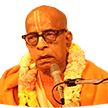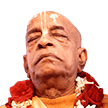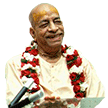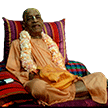Perfect Knowledge - an essential subject: Difference between revisions
(Created page with "Category:Essential Subjects <!----------------------- edit below this line -----------------------> <!------------------------ begin introduction text --------------------...") |
(Vanibot #0041: Moves Choose Another box to the end) |
||
| Line 2: | Line 2: | ||
<!----------------------- edit below this line -----------------------> | <!----------------------- edit below this line -----------------------> | ||
<!------------------------ begin introduction text ------------------------> | <!------------------------ begin introduction text ------------------------> | ||
Śruti-pramāṇa means the perfect knowledge | Śruti-pramāṇa means the perfect knowledge that is coming from the supreme perfect, Kṛṣṇa. Brahmā is the first created being, so Brahmā was instructed the śruti, perfect knowledge, by Kṛṣṇa. Kṛṣṇa is the original spiritual master. Vedānta-vit. Unintelligent men with a poor fund of knowledge cannot understand Bhagavān, Brahman or Paramātmā, but after studying the Vedas through paramparā system and attaining the understanding of the Absolute Truth, the Supreme Personality of Godhead, one is supposed to be on the platform of perfect knowledge. | ||
Srila Prabhupada's books, lectures, conversations and letters offer a comprehensive presentation of this essential subject as seen in the '''[[Vaniquotes:Category:Perfect Knowledge| | Srila Prabhupada's books, lectures, conversations and letters offer a comprehensive presentation of this essential subject as seen in the Vaniquotes '''[[Vaniquotes:Category:Perfect Knowledge|Perfect Knowledge]]''' category. An introduction from his books is given below in the following 15 quotes. | ||
<!-------- end introduction text and don't touch next three lines ---------> | <!-------- end introduction text and don't touch next three lines ---------> | ||
---- | ---- | ||
== Quotes from Srila Prabhupada's books == | == Quotes from Srila Prabhupada's books == | ||
<!----------------- edit quote boxes below this line -----------------> | <!----------------- edit quote boxes below this line -----------------> | ||
{{VaniQuotebox|The Vedas contain perfect knowledge, which includes all kinds of knowledge necessary for the human society, not only on this particular planet but on other planets as well|The Vedas contain perfect knowledge, which includes all kinds of knowledge necessary for the human society, not only on this particular planet but on other planets as well. It is understood that military art is also necessary knowledge for the upkeep of social order, as is the art of music. All these groups of knowledge are called the Upapurāṇa, or supplements of the Vedas. '''( Śrīmad-Bhāgavatam 3.12.38)'''}} | {{VaniQuotebox|The Vedas contain perfect knowledge, which includes all kinds of knowledge necessary for the human society, not only on this particular planet but on other planets as well|The Vedas contain perfect knowledge, which includes all kinds of knowledge necessary for the human society, not only on this particular planet but on other planets as well. It is understood that military art is also necessary knowledge for the upkeep of social order, as is the art of music. All these groups of knowledge are called the Upapurāṇa, or supplements of the Vedas. '''(Śrīmad-Bhāgavatam 3.12.38)'''}} | ||
{{VaniQuotebox|Perfect knowledge is called parampara, or deductive knowledge coming down from the authority to the submissive aural receiver who is bona fide by service and surrender. One cannot challenge the authority of the Supreme|Perfect knowledge is called paramparā, or deductive knowledge coming down from the authority to the submissive aural receiver who is bona fide by service and surrender. One cannot challenge the authority of the Supreme and know Him also at the same time. He reserves the right of not being exposed to such a challenging spirit of an insignificant spark of the whole, a spark subjected to the control of illusory energy. The devotees are submissive, and therefore the transcendental knowledge descends from the Personality of Godhead to Brahmā and from Brahmā to his sons and disciples in succession | {{VaniQuotebox|Perfect knowledge is called parampara, or deductive knowledge coming down from the authority to the submissive aural receiver who is bona fide by service and surrender. One cannot challenge the authority of the Supreme|Perfect knowledge is called paramparā, or deductive knowledge coming down from the authority to the submissive aural receiver who is bona fide by service and surrender. One cannot challenge the authority of the Supreme and know Him also at the same time. He reserves the right of not being exposed to such a challenging spirit of an insignificant spark of the whole, a spark subjected to the control of illusory energy. The devotees are submissive, and therefore the transcendental knowledge descends from the Personality of Godhead to Brahmā and from Brahmā to his sons and disciples in succession. '''(Śrīmad-Bhāgavatam 1.2.21)'''}} | ||
{{VaniQuotebox|Without perfect knowledge, one cannot act perfectly. The real source of knowledge is the vacah, or sound vibration, given by Vedic instructions|Lord Śiva prays to be engaged both in mind and in action in the devotional service of the Supreme Lord according to the direction of the Vedas. This is the process for purifying false egotism. Cetaḥ means "knowledge." Without perfect knowledge, one cannot act perfectly. The real source of knowledge is the vācaḥ, or sound vibration, given by Vedic instructions. '''( Śrīmad-Bhāgavatam 4.24.43)'''}} | {{VaniQuotebox|Without perfect knowledge, one cannot act perfectly. The real source of knowledge is the vacah, or sound vibration, given by Vedic instructions|Lord Śiva prays to be engaged both in mind and in action in the devotional service of the Supreme Lord according to the direction of the Vedas. This is the process for purifying false egotism. Cetaḥ means "knowledge." Without perfect knowledge, one cannot act perfectly. The real source of knowledge is the vācaḥ, or sound vibration, given by Vedic instructions. '''(Śrīmad-Bhāgavatam 4.24.43)'''}} | ||
{{VaniQuotebox|When the living entity perfectly performs spiritual activities under the direction of the spiritual master, he becomes perfect in knowledge and understands that he is not God but a servant of God|One who engages in the spiritual activities of unalloyed devotional service is immediately elevated to the transcendental platform, and he is to be considered brahma-bhūta, which indicates that he is no longer in the material world but is in the spiritual world. Devotional service is enlightenment, or awakening. When the living entity perfectly performs spiritual activities under the direction of the spiritual master, he becomes perfect in knowledge and understands that he is not God but a servant of God. '''( Caitanya-caritāmṛta, Ādi-līlā 7.118)'''}} | {{VaniQuotebox|When the living entity perfectly performs spiritual activities under the direction of the spiritual master, he becomes perfect in knowledge and understands that he is not God but a servant of God|One who engages in the spiritual activities of unalloyed devotional service is immediately elevated to the transcendental platform, and he is to be considered brahma-bhūta, which indicates that he is no longer in the material world but is in the spiritual world. Devotional service is enlightenment, or awakening. When the living entity perfectly performs spiritual activities under the direction of the spiritual master, he becomes perfect in knowledge and understands that he is not God but a servant of God. '''(Caitanya-caritāmṛta, Ādi-līlā 7.118)'''}} | ||
{{VaniQuotebox|To execute religious principles means to come to the platform of perfect knowledge. If one comes to the platform of perfect knowledge, then he will be uninterested in material affairs. Perfect knowledge means knowledge of one's self and the Supreme Self|To execute religious principles means to come to the platform of perfect knowledge. If one comes to the platform of perfect knowledge, then he will be uninterested in material affairs. Perfect knowledge means knowledge of one's own self and the Supreme Self. The Supreme Self and the individual self, although one in quality, are different in quantity. '''( Kṛṣṇa Book, Chapter 89)'''}} | {{VaniQuotebox|To execute religious principles means to come to the platform of perfect knowledge. If one comes to the platform of perfect knowledge, then he will be uninterested in material affairs. Perfect knowledge means knowledge of one's self and the Supreme Self|To execute religious principles means to come to the platform of perfect knowledge. If one comes to the platform of perfect knowledge, then he will be uninterested in material affairs. Perfect knowledge means knowledge of one's own self and the Supreme Self. The Supreme Self and the individual self, although one in quality, are different in quantity. '''(Kṛṣṇa Book, Chapter 89)'''}} | ||
{{VaniQuotebox|Those who are actually in perfect knowledge of the science of God know that the living entities are superior energy of the Supreme Lord|Lord says that those who are advanced in transcendental knowledge and know the science of Kṛṣṇa consciousness are very dear to Him, and He also is very dear to them. Those who are actually in perfect knowledge of the science of God know that the living entities are superior energy of the Supreme Lord. '''( Śrīmad-Bhāgavatam 4.7.38)'''}} | {{VaniQuotebox|Those who are actually in perfect knowledge of the science of God know that the living entities are superior energy of the Supreme Lord|Lord says that those who are advanced in transcendental knowledge and know the science of Kṛṣṇa consciousness are very dear to Him, and He also is very dear to them. Those who are actually in perfect knowledge of the science of God know that the living entities are superior energy of the Supreme Lord. '''(Śrīmad-Bhāgavatam 4.7.38)'''}} | ||
{{VaniQuotebox|The whole process (of Krsna consciousness) depends on perfect knowledge of the soul beyond the conception of the body - not theoretically but practically, when there is no longer a chance for sense gratification manifested in fruitive activities|The whole process (of Kṛṣṇa consciousness) depends on perfect knowledge of the soul beyond the conception of the body—not theoretically but practically, when there is no longer a chance for sense gratification manifested in fruitive activities. One who is not firmly fixed in mind is diverted by various types of fruitive activities. '''( Bhagavad-gītā 2.41)'''}} | {{VaniQuotebox|The whole process (of Krsna consciousness) depends on perfect knowledge of the soul beyond the conception of the body - not theoretically but practically, when there is no longer a chance for sense gratification manifested in fruitive activities|The whole process (of Kṛṣṇa consciousness) depends on perfect knowledge of the soul beyond the conception of the body—not theoretically but practically, when there is no longer a chance for sense gratification manifested in fruitive activities. One who is not firmly fixed in mind is diverted by various types of fruitive activities. '''(Bhagavad-gītā 2.41)'''}} | ||
{{VaniQuotebox|The perfect knowledge | {{VaniQuotebox|The perfect knowledge can descend by the chain of disciplic succession only, and not by any form of experimental knowledge, old or modern|We can know something of the unlimited when it is explained by the unlimited, as has been done by the Lord Himself in the unique statements of the Bhagavad-gītā, and it can also be known to some extent from realized souls like Śukadeva Gosvāmī, who learned it from Vyāsadeva, a disciple of Nārada, and thus the perfect knowledge can descend by the chain of disciplic succession only, and not by any form of experimental knowledge, old or modern. '''(Śrīmad-Bhāgavatam 2.4.8)'''}} | ||
{{VaniQuotebox| | {{VaniQuotebox|By establishment of the eternal relation, pure devotional service to the Lord begins gradually developing into perfect knowledge of the Personality of Godhead beyond the purview of impersonal Brahman and localized Paramatma|After the relation is ascertained by establishment of the eternal relation, pure devotional service to the Lord begins gradually developing into perfect knowledge of the Personality of Godhead beyond the purview of impersonal Brahman and localized Paramātmā. By such puruṣottama-yoga, as it is stated in the Bhagavad-gītā, one is made perfect even during the present corporeal existence, and one exhibits all the good qualities of the Lord to the highest percentage. Such is the gradual development by association of pure devotees. '''(Śrīmad-Bhāgavatam 1.5.34)'''}} | ||
{{VaniQuotebox| | {{VaniQuotebox|Brahma admits that in spite of his perfect knowledge in the Vedas, he was unable to know the glories of the Lord. Since no one can be more than Lord Brahma, how can a so-called Vedantist be perfectly cognizant of the Absolute Truth|Lord Brahmā is the first living being, who directly learned the Vedic wisdom from the Lord (tene brahma hṛdā ya ādi-kavaye ( Śrīmad-Bhāgavatam 1.1.1)). Therefore, who can be a more learned Vedāntist than Lord Brahmā? He admits that in spite of his perfect knowledge in the Vedas, he was unable to know the glories of the Lord. Since no one can be more than Lord Brahmā, how can a so-called Vedāntist be perfectly cognizant of the Absolute Truth? The so-called Vedāntist, therefore, cannot enter into the existence of the Lord without being trained in the matter of bhakti-vedānta, or Vedānta plus bhakti. '''(Śrīmad-Bhāgavatam 2.6.35)'''}} | ||
{{VaniQuotebox| | {{VaniQuotebox|Because the person in Krsna consciousness is devoid of all kinds of sense-gratificatory propensities, it is to be understood that he has burned up the reactions of his work by perfect knowledge of his constitutional position|Only a person in full knowledge can understand the activities of a person in Kṛṣṇa consciousness. Because the person in Kṛṣṇa consciousness is devoid of all kinds of sense-gratificatory propensities, it is to be understood that he has burned up the reactions of his work by perfect knowledge of his constitutional position as the eternal servitor of the Supreme Personality of Godhead. He is actually learned who has attained to such perfection of knowledge. '''(Bhagavad-gītā 4.19)'''}} | ||
{{VaniQuotebox| | {{VaniQuotebox|Although the brahmana friend of Lord Krsna was a householder, he was not busy accumulating wealth for very comfortable living; he was satisfied by the income which came according to his destiny. This is the sign of perfect knowledge|Although the brāhmaṇa friend of Lord Kṛṣṇa was a householder, he was not busy accumulating wealth for very comfortable living; therefore he was satisfied by the income which automatically came to him according to his destiny. This is the sign of perfect knowledge. A man in perfect knowledge knows that one cannot be happier than he is destined to be. '''(Kṛṣṇa Book, Chapter 80)'''}} | ||
{{VaniQuotebox|When perfect knowledge is expanded, one ceases to see the outward covering of the living entity. He sees, rather, the spirit soul within the body|When perfect knowledge is expanded, one ceases to see the outward covering of the living entity. He sees, rather, the spirit soul within the body. Thus he does not make distinctions between a human being and an animal, a learned brāhmaṇa and a caṇḍāla. '''(Śrīmad-Bhāgavatam 4.31.2)'''}} | |||
{{VaniQuotebox|When perfect knowledge is expanded, one ceases to see the outward covering of the living entity. He sees, rather, the spirit soul within the body|When perfect knowledge is expanded, one ceases to see the outward covering of the living entity. He sees, rather, the spirit soul within the body. Thus he does not make distinctions between a human being and an animal, a learned brāhmaṇa and a caṇḍāla. '''( Śrīmad-Bhāgavatam 4.31.2)'''}} | |||
{{VaniQuotebox|Perfect knowledge means knowing Krsna as the root of this Brahman effulgence. This knowledge can be gained from such scriptures as Srimad-Bhagavatam, which perfectly elaborates the science of Krsna|Perfect knowledge means knowing Kṛṣṇa as the root of this Brahman effulgence. This knowledge can be gained from such scriptures as Śrīmad-Bhāgavatam, which perfectly elaborates the science of Kṛṣṇa. In Śrīmad-Bhāgavatam, the author, Śrīla Vyāsadeva, has established that one will describe the Supreme Truth as Brahman, Paramātmā or Bhagavān according to one's realization of Him. '''(Sri Isopaniṣad, Mantra 15)'''}} | {{VaniQuotebox|Perfect knowledge means knowing Krsna as the root of this Brahman effulgence. This knowledge can be gained from such scriptures as Srimad-Bhagavatam, which perfectly elaborates the science of Krsna|Perfect knowledge means knowing Kṛṣṇa as the root of this Brahman effulgence. This knowledge can be gained from such scriptures as Śrīmad-Bhāgavatam, which perfectly elaborates the science of Kṛṣṇa. In Śrīmad-Bhāgavatam, the author, Śrīla Vyāsadeva, has established that one will describe the Supreme Truth as Brahman, Paramātmā or Bhagavān according to one's realization of Him. '''(Sri Isopaniṣad, Mantra 15)'''}} | ||
{{VaniQuotebox|Perfect knowledge is that the Supreme Soul, Krsna, is the supreme shelter for all living entities, and giving up such shelter, the living entities are deluded by the material energy, imagining themselves to have a separate identity|One can acquire such pure knowledge only from the bona fide spiritual master and thereby avoid the delusion that the living entity is equal to Kṛṣṇa. Perfect knowledge is that the Supreme Soul, Kṛṣṇa, is the supreme shelter for all living entities, and giving up such shelter, the living entities are deluded by the material energy, imagining themselves to have a separate identity. '''( Bhagavad-gītā 4.35)'''}} | {{VaniQuotebox|Perfect knowledge is that the Supreme Soul, Krsna, is the supreme shelter for all living entities, and giving up such shelter, the living entities are deluded by the material energy, imagining themselves to have a separate identity|One can acquire such pure knowledge only from the bona fide spiritual master and thereby avoid the delusion that the living entity is equal to Kṛṣṇa. Perfect knowledge is that the Supreme Soul, Kṛṣṇa, is the supreme shelter for all living entities, and giving up such shelter, the living entities are deluded by the material energy, imagining themselves to have a separate identity. '''(Bhagavad-gītā 4.35)'''}} | ||
<!----------------- edit quote boxes above this line -----------------> | <!----------------- edit quote boxes above this line -----------------> | ||
| Line 47: | Line 45: | ||
'''Perfect Knowledge - [[Vaniquotes:Category:Perfect Knowledge|explore more within this category]]'''. | '''Perfect Knowledge - [[Vaniquotes:Category:Perfect Knowledge|explore more within this category]]'''. | ||
{{EsentialSubjectTotal}} | |||
<div style="float:left;"> | |||
{{EssentialSubjectnav}} | |||
</div> | |||
__NOTOC__ | __NOTOC__ | ||
__NOEDITSECTION__ | __NOEDITSECTION__ | ||
Latest revision as of 17:07, 22 November 2020
Śruti-pramāṇa means the perfect knowledge that is coming from the supreme perfect, Kṛṣṇa. Brahmā is the first created being, so Brahmā was instructed the śruti, perfect knowledge, by Kṛṣṇa. Kṛṣṇa is the original spiritual master. Vedānta-vit. Unintelligent men with a poor fund of knowledge cannot understand Bhagavān, Brahman or Paramātmā, but after studying the Vedas through paramparā system and attaining the understanding of the Absolute Truth, the Supreme Personality of Godhead, one is supposed to be on the platform of perfect knowledge.
Srila Prabhupada's books, lectures, conversations and letters offer a comprehensive presentation of this essential subject as seen in the Vaniquotes Perfect Knowledge category. An introduction from his books is given below in the following 15 quotes.
Quotes from Srila Prabhupada's books
Perfect Knowledge - explore more within this category.
Vanipedia has now over 903 introductory articles compiled from Srila Prabhupada's books under the series titled Essential Subjects. All these articles can be seen in the Table of Content on the right side of this article and also here in this Umbrella Category. Browse through them to relish the breadth and depth of Srila Prabhupada's teachings - There is a subject for everyone.














